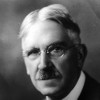“ A narrow and moralistic view of morals is responsible for the failure to recognize that all the aims and values which are desirable in education are themselves moral. ”
John Dewey, Democracy and Education (1916). copy citation
| Author | John Dewey |
|---|---|
| Source | Democracy and Education |
| Topic | education failure |
| Date | 1916 |
| Language | English |
| Reference | |
| Note | |
| Weblink | http://www.gutenberg.org/files/852/852-h/852-h.htm |
Context
“But as a rule, the absence of a social environment in connection with which learning is a need and a reward is the chief reason for the isolation of the school; and this isolation renders school knowledge inapplicable to life and so infertile in character.
A narrow and moralistic view of morals is responsible for the failure to recognize that all the aims and values which are desirable in education are themselves moral. Discipline, natural development, culture, social efficiency, are moral traits—marks of a person who is a worthy member of that society which it is the business of education to further. There is an old saying to the effect that it is not enough for a man to be good;”
source


